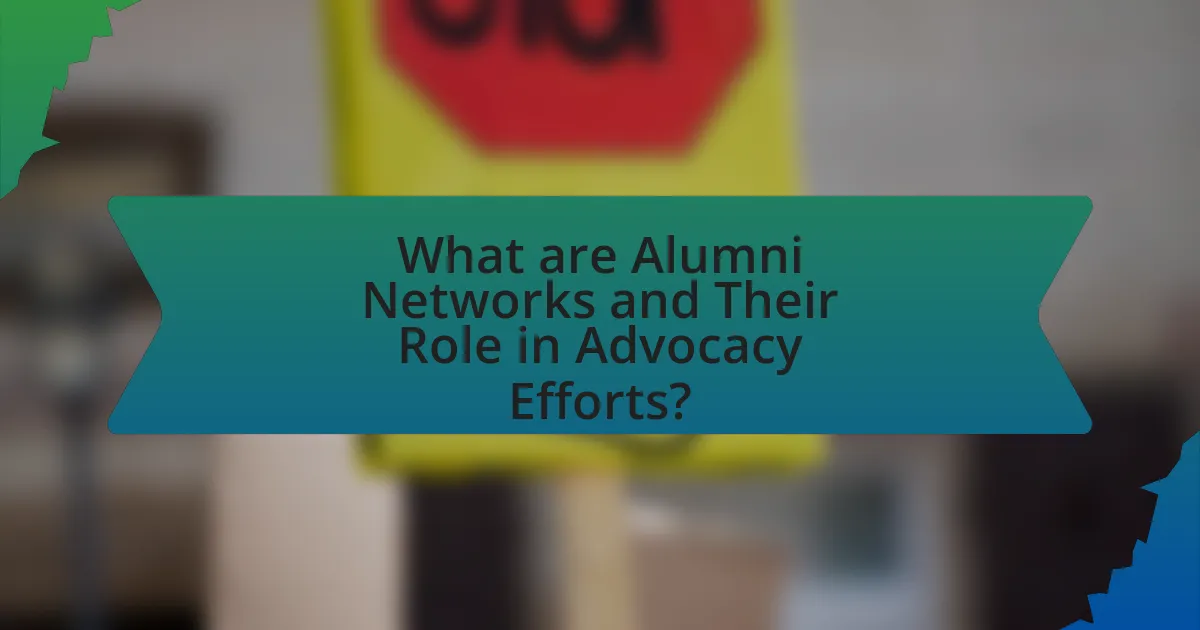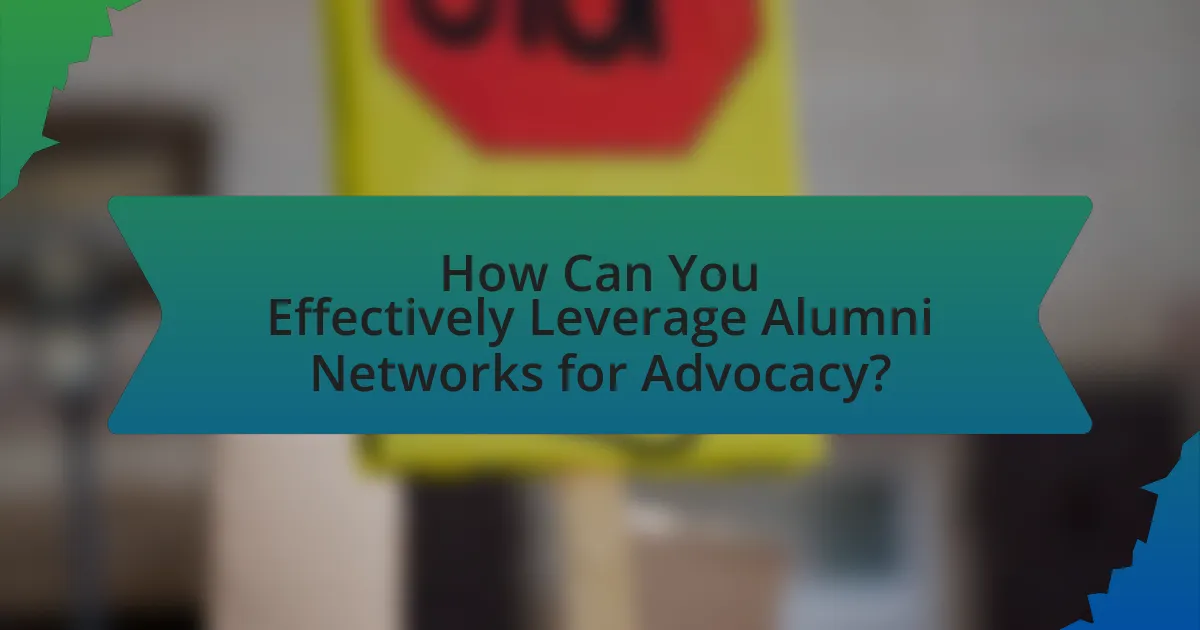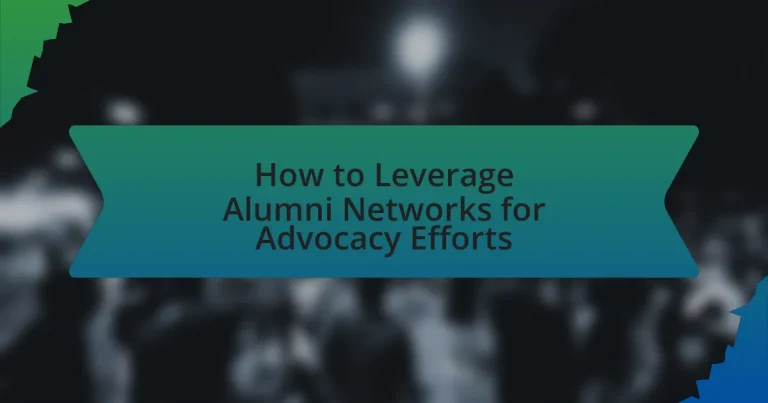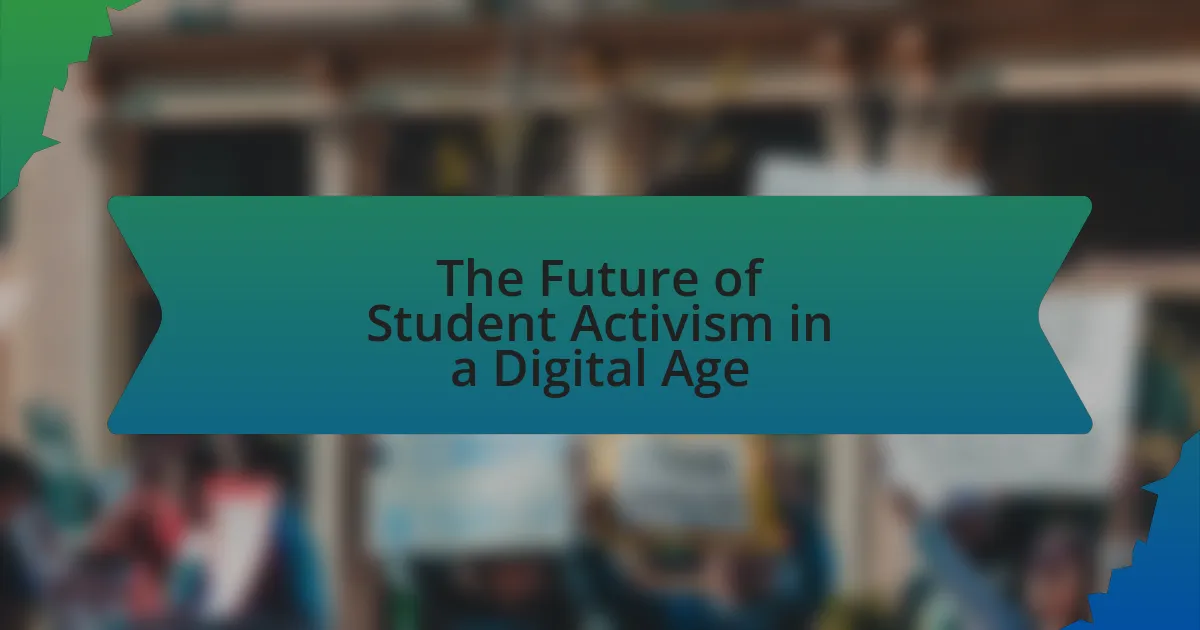Alumni networks are organized groups of former students that play a crucial role in advocacy efforts by mobilizing resources, sharing expertise, and amplifying voices for various causes. These networks facilitate collaboration among alumni to influence policy changes, raise funds, and advocate for educational reforms. Key components of effective alumni networks include strong communication channels, engagement opportunities, and mentorship programs, which enhance connectivity and foster a sense of community. The article explores how alumni networks function in advocacy, the unique advantages alumni bring, strategies for engagement, and the challenges faced in leveraging these networks for impactful advocacy initiatives.

What are Alumni Networks and Their Role in Advocacy Efforts?
Alumni networks are organized groups of former students from the same educational institution, and they play a significant role in advocacy efforts by mobilizing resources, sharing expertise, and amplifying voices for various causes. These networks facilitate connections among alumni, enabling them to collaborate on initiatives that promote the interests of their alma mater or address societal issues. For instance, alumni can leverage their professional networks to influence policy changes, raise funds for specific projects, or advocate for educational reforms. Research indicates that alumni engagement can lead to increased donations and support for institutional goals, demonstrating the tangible impact of these networks in advocacy contexts.
How do alumni networks function in the context of advocacy?
Alumni networks function in the context of advocacy by mobilizing former students to support specific causes or initiatives related to their alma mater or shared interests. These networks leverage the collective influence, resources, and connections of alumni to amplify advocacy efforts, such as fundraising, policy change, or community engagement. For instance, a study by the Council for Advancement and Support of Education (CASE) found that alumni who are actively engaged in their networks are more likely to contribute to advocacy campaigns, demonstrating the effectiveness of these connections in driving support for various initiatives.
What are the key components of an effective alumni network?
The key components of an effective alumni network include strong communication channels, engagement opportunities, mentorship programs, and a sense of community. Strong communication channels facilitate information sharing and updates among alumni, enhancing connectivity. Engagement opportunities, such as events and workshops, encourage participation and foster relationships. Mentorship programs connect experienced alumni with newer graduates, providing guidance and support. A sense of community is cultivated through shared experiences and values, which strengthens ties among members. These components collectively contribute to a robust alumni network that can effectively support advocacy efforts.
How do alumni networks facilitate communication and collaboration?
Alumni networks facilitate communication and collaboration by providing structured platforms for former students to connect, share resources, and collaborate on initiatives. These networks often utilize online forums, social media groups, and organized events to enable members to exchange ideas, seek advice, and form partnerships. Research indicates that alumni who engage in these networks report increased professional opportunities and enhanced collaboration on projects, demonstrating the effectiveness of these connections in fostering a supportive community.
Why are alumni networks important for advocacy?
Alumni networks are important for advocacy because they create a collective voice that can influence decision-makers and drive change. These networks leverage the shared experiences and connections of former students to mobilize support for specific causes, enhancing the effectiveness of advocacy efforts. For instance, alumni can provide valuable resources, such as funding, expertise, and access to influential contacts, which can significantly amplify the impact of advocacy initiatives. Studies have shown that organizations with strong alumni networks are more successful in achieving their advocacy goals, as they can tap into a diverse pool of skills and perspectives that strengthen their campaigns.
What unique advantages do alumni bring to advocacy efforts?
Alumni bring unique advantages to advocacy efforts through their established networks, credibility, and shared experiences. Their connections can facilitate access to influential stakeholders, enhancing the reach and impact of advocacy initiatives. Alumni often possess a deep understanding of the organization’s mission, which allows them to communicate effectively and passionately about the cause. Additionally, studies show that alumni engagement can lead to increased funding and support; for instance, a report by the Council for Advancement and Support of Education indicates that alumni are more likely to donate when they feel connected to their alma mater’s advocacy efforts. This combination of networking, credibility, and emotional investment makes alumni invaluable assets in advocacy campaigns.
How can alumni networks amplify the impact of advocacy initiatives?
Alumni networks can amplify the impact of advocacy initiatives by leveraging their collective influence, resources, and connections to mobilize support and raise awareness. These networks often consist of individuals who share a common educational background, which fosters a sense of community and shared purpose. For instance, alumni can organize events, fundraisers, and campaigns that align with advocacy goals, thereby increasing visibility and engagement. Research indicates that alumni who are actively involved in advocacy efforts can significantly enhance outreach; for example, a study by the Council for Advancement and Support of Education found that alumni engagement can lead to a 30% increase in participation rates for advocacy campaigns. This demonstrates that the collaborative efforts of alumni can create a more substantial impact on advocacy initiatives.

How Can You Effectively Leverage Alumni Networks for Advocacy?
To effectively leverage alumni networks for advocacy, organizations should engage alumni through targeted communication and collaborative initiatives. By utilizing platforms like social media and alumni events, organizations can foster connections and encourage alumni to participate in advocacy efforts. Research indicates that alumni who feel a strong connection to their alma mater are more likely to support its initiatives; for instance, a study by the Council for Advancement and Support of Education found that engaged alumni contribute significantly more to advocacy campaigns than non-engaged alumni. Therefore, maintaining ongoing relationships and providing opportunities for alumni to contribute can enhance advocacy outcomes.
What strategies can be employed to engage alumni in advocacy?
To engage alumni in advocacy, organizations can implement targeted communication strategies, such as personalized outreach and storytelling. Personalized outreach involves tailoring messages to individual alumni based on their interests and past involvement, which increases the likelihood of engagement. Storytelling can effectively illustrate the impact of advocacy efforts, making alumni feel connected to the cause. Research indicates that alumni who receive personalized communication are 50% more likely to participate in advocacy initiatives. Additionally, creating opportunities for alumni to share their experiences and insights can foster a sense of community and encourage active participation in advocacy efforts.
How can storytelling be used to motivate alumni participation?
Storytelling can motivate alumni participation by creating emotional connections that resonate with their experiences and values. When alumni hear compelling narratives about the impact of their contributions, such as specific success stories of current students or community initiatives funded by alumni donations, they are more likely to feel a sense of belonging and responsibility towards their alma mater. Research shows that emotional engagement significantly increases the likelihood of participation; for instance, a study by the Association of Fundraising Professionals found that storytelling can enhance donor engagement by up to 50%. This demonstrates that effective storytelling not only highlights the importance of alumni involvement but also fosters a community spirit that encourages ongoing participation.
What role does social media play in connecting with alumni for advocacy?
Social media serves as a vital tool for connecting with alumni for advocacy by facilitating communication, engagement, and community building. Platforms like LinkedIn, Facebook, and Twitter enable alumni to share experiences, updates, and opportunities related to advocacy initiatives, fostering a sense of belonging and collective purpose. Research indicates that 70% of alumni engage with their alma mater through social media, highlighting its effectiveness in maintaining relationships and mobilizing support for advocacy efforts. This connectivity allows organizations to leverage alumni networks for fundraising, awareness campaigns, and policy influence, ultimately enhancing the impact of advocacy initiatives.
How can partnerships enhance alumni advocacy efforts?
Partnerships can enhance alumni advocacy efforts by providing resources, expanding networks, and increasing visibility for advocacy initiatives. Collaborations with organizations, businesses, or other educational institutions can offer alumni access to funding, mentorship, and platforms to amplify their voices. For instance, partnerships with local businesses can lead to sponsorship opportunities for alumni-led events, thereby increasing participation and engagement. Additionally, research shows that alumni who are connected through partnerships are more likely to participate in advocacy efforts, as they feel a stronger sense of community and shared purpose. This interconnectedness fosters a collaborative environment that encourages alumni to advocate for their alma mater and its mission effectively.
What types of organizations should alumni networks partner with?
Alumni networks should partner with educational institutions, non-profit organizations, and industry associations. Educational institutions can provide resources and support for career development, while non-profit organizations can align with alumni networks to promote social causes and community engagement. Industry associations can facilitate networking opportunities and professional development, enhancing the value of alumni connections. Collaborations with these types of organizations can lead to increased advocacy efforts and greater impact within communities.
How can collaborative events strengthen advocacy initiatives?
Collaborative events can strengthen advocacy initiatives by fostering partnerships that amplify collective impact. When organizations unite for a common cause, they pool resources, share expertise, and expand their reach, which enhances visibility and engagement. For instance, a study by the Stanford Social Innovation Review highlights that collaborative efforts can lead to a 30% increase in advocacy effectiveness due to shared networks and resources. This synergy not only mobilizes a larger audience but also creates a platform for diverse voices, making advocacy efforts more inclusive and representative.

What Challenges Might You Face When Leveraging Alumni Networks?
When leveraging alumni networks, one may face challenges such as lack of engagement, varying levels of commitment, and difficulty in accessing contact information. Alumni may not actively participate due to time constraints or disinterest, leading to a diminished network effect. Additionally, alumni may have different priorities or motivations, which can affect their willingness to support advocacy efforts. Accessing updated contact information can also be problematic, as alumni may change jobs or relocate, making it harder to reach them for collaboration. These challenges can hinder the effectiveness of advocacy initiatives that rely on strong alumni participation.
What common obstacles do alumni networks encounter in advocacy?
Alumni networks commonly encounter obstacles in advocacy such as lack of engagement, insufficient resources, and fragmented communication. Lack of engagement often arises from alumni feeling disconnected from their alma mater, which can lead to low participation in advocacy initiatives. Insufficient resources, including funding and manpower, can hinder the ability of these networks to effectively mobilize for causes. Fragmented communication, where information does not flow smoothly among alumni, can result in misalignment of goals and efforts, ultimately diminishing the impact of advocacy campaigns. These challenges are frequently documented in studies examining alumni relations and advocacy effectiveness, highlighting the need for strategic approaches to overcome them.
How can miscommunication affect alumni engagement?
Miscommunication can significantly hinder alumni engagement by creating misunderstandings about events, initiatives, and opportunities for involvement. When alumni receive unclear or conflicting information, they may feel disconnected from their alma mater, leading to decreased participation in events and reduced willingness to support fundraising efforts. For instance, a study by the Council for Advancement and Support of Education found that effective communication strategies are linked to higher alumni participation rates, indicating that clarity and consistency in messaging are crucial for fostering strong alumni relationships.
What strategies can mitigate resistance from alumni?
To mitigate resistance from alumni, institutions should engage in transparent communication and actively involve alumni in decision-making processes. By fostering open dialogue, institutions can address concerns and build trust, which is essential for alumni support. Research indicates that alumni are more likely to engage positively when they feel their opinions are valued; for instance, a study by the Council for Advancement and Support of Education found that 70% of alumni prefer institutions that solicit their feedback on initiatives. Additionally, creating opportunities for alumni to participate in events and initiatives can enhance their sense of belonging and investment in the institution, further reducing resistance.
How can you measure the success of alumni advocacy efforts?
The success of alumni advocacy efforts can be measured through metrics such as engagement rates, fundraising outcomes, and participation in advocacy initiatives. Engagement rates can be assessed by tracking the number of alumni who actively participate in events, respond to surveys, or engage on social media platforms. Fundraising outcomes provide a quantifiable measure of success, as increased donations or contributions to specific causes indicate effective advocacy. Additionally, participation in advocacy initiatives, such as lobbying efforts or community service projects, can be evaluated by the number of alumni involved and the impact of their actions on policy changes or community improvements. These metrics collectively provide a comprehensive view of the effectiveness of alumni advocacy efforts.
What metrics are most effective for evaluating advocacy impact?
The most effective metrics for evaluating advocacy impact include changes in policy, public awareness levels, and engagement rates. Changes in policy can be measured by tracking legislative outcomes or shifts in regulations directly influenced by advocacy efforts. Public awareness levels can be assessed through surveys that gauge knowledge and attitudes before and after advocacy campaigns. Engagement rates, such as the number of participants in advocacy events or interactions on social media platforms, provide quantitative data on the reach and effectiveness of advocacy initiatives. These metrics collectively offer a comprehensive view of advocacy impact, supported by evidence from various advocacy campaigns that demonstrate measurable outcomes in these areas.
How can feedback from alumni improve future advocacy initiatives?
Feedback from alumni can significantly enhance future advocacy initiatives by providing insights into the effectiveness of past efforts and identifying areas for improvement. Alumni, having experienced the initiatives firsthand, can share their perspectives on what strategies resonated with them and which did not, allowing organizations to refine their approaches. For instance, a study by the Council for Advancement and Support of Education found that alumni engagement directly correlates with the success of advocacy campaigns, as informed alumni can offer valuable suggestions based on their experiences. This feedback loop fosters a more targeted and effective advocacy strategy, ultimately leading to increased support and participation from the alumni network.
What are the best practices for sustaining alumni engagement in advocacy?
The best practices for sustaining alumni engagement in advocacy include establishing regular communication, creating meaningful opportunities for involvement, and recognizing alumni contributions. Regular communication through newsletters, social media, and events keeps alumni informed and connected to advocacy efforts. Meaningful opportunities, such as volunteer roles, mentorship programs, or participation in advocacy campaigns, encourage active involvement. Recognizing alumni contributions through awards or public acknowledgment fosters a sense of belonging and appreciation, which can enhance their commitment to advocacy initiatives. These practices are supported by studies indicating that engaged alumni are more likely to contribute to advocacy efforts and support their alma mater’s mission.
How can regular communication maintain alumni interest?
Regular communication can maintain alumni interest by fostering a sense of community and engagement. When institutions consistently reach out to alumni through newsletters, events, and social media, they create opportunities for alumni to reconnect with their alma mater and each other. This ongoing dialogue keeps alumni informed about developments, achievements, and opportunities within the institution, reinforcing their connection and loyalty. Research indicates that alumni who receive regular updates are more likely to participate in events and contribute to fundraising efforts, as evidenced by a study from the Council for Advancement and Support of Education, which found that engaged alumni are 50% more likely to donate.
What role does recognition play in sustaining alumni involvement?
Recognition plays a crucial role in sustaining alumni involvement by fostering a sense of belonging and appreciation among former students. When alumni are acknowledged for their contributions, whether through awards, public recognition, or personalized communication, they feel valued and connected to their alma mater. This connection encourages ongoing engagement, as evidenced by studies showing that institutions with robust recognition programs report higher alumni participation rates in events and fundraising efforts. For instance, a survey conducted by the Council for Advancement and Support of Education found that 70% of alumni who received recognition were more likely to donate compared to those who did not. Thus, recognition not only enhances alumni satisfaction but also strengthens their commitment to supporting their institution’s advocacy efforts.




